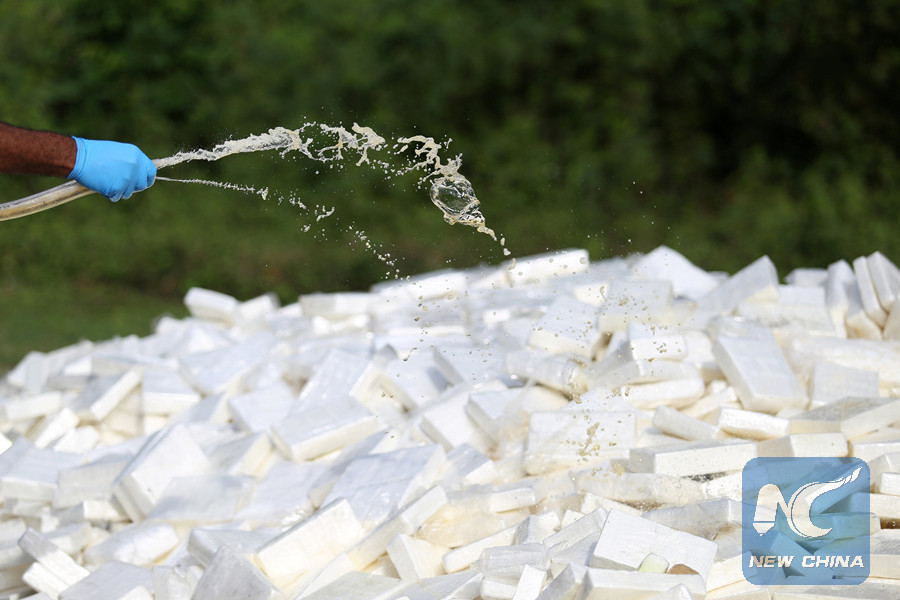
A police officer sprays gasoline on packages of cocaine, seized from a ship stopped in international waters. (Reuters photo)
ANKARA, Jan. 10 (Xinhua) -- Turkey's drug problem has reached epidemic proportions in recent years and its usage age has dropped dramatically despite the heavy crackdown on narcotics trafficking across the country amid a lack of sustainable solutions for addicts, warned experts and officials.
"I am clean since 5 years ago but I used cannabis, alcohol, ecstasy and other synthetic drugs for over 8 years. Because of my addiction I was in a severe health condition and had to be hospitalized in the end. I was weighing only 43 kilos when I was admitted," Seyyide Yoruk told Xinhua in a telephone interview.
This 34-year-old repentant drug addict said her family considers drug abuse as "something ashamed of" in a largely conservative and patriarchal Muslim society, which makes it very difficult for the addicts to look for a clean life and there are few state-sponsored medical facilities that can properly take care of them.
"Antalya is now the capital of heroin in Turkey. There is the real deal which is pure and difficult to reach and the synthetic one that you can buy for 20 liras (5.4 U.S. dollars) per fix. No one knows what's inside and it can cause deadly overdoses," Yoruk said.
Turkish Deputy Prime Minister Recep Akdag sounded the alarm bell last week. He said his country seizes more drugs than Europe and trafficking of drugs from Iran and Afghanistan usually goes through Turkey.
In 2017, Turkish authorities detained 47,213 people, including 232 foreigners, for drug-related offenses, Akdag said.
"However, there is another trafficking route which starts from the Netherlands, partly from Belgium and Austria and is targeting Turkey," he noted, calling on Brussels, Belgium, Austria and Poland to do more to stop drug runners in Europe.
"These substances, which are used by young people who end up in a sorry state on the streets, are manufactured in the Netherlands, Belgium or Austria and partially in Poland," the Turkish senior official explained.
He was referring to the cheap synthetic drug called bonsai which is holding a large number of youths prisoner of its effects.
Operations have led to the seizure of 5,778,593 illegal drugs in the pill-form, including ecstasy, amphetamine and prescriptions, Akdag said.
Despite harsh legislation and intense police work, synthetic drug abuse is on the rise among low-income Turkish youths, even in conservative neighborhoods in big cities.
"It's even more terrible in the east (of Turkey). Drugs have even made their way to small villages in rural areas where kids aged 9 or 10 are using it," Fatih Yuzuguler, a former addict, told Xinhua.
The 26-year-old Kurdish man said he pretty much used every drug from cannabis to cocaine and methamphetamine to heroin.
"I was responsible also for the fact that my wife started to use it with me until we ended sleeping in the streets, without income or money, food or dignity," said Yuzuguler, who is now clean and so is his wife.
Yuzuguler now tries to help new addicts and their families to sever ties with narcotics, which is a very hard task in an impoverished and conservative environment.
"To be sober is a lifetime commitment. Like a diabetic we struggle to keep away from our kind of sweets," said Yoruk.
He called on the state to establish a comprehensive mechanism for the social problem, and raise awareness of the plight of young addicts.
Turkish Interior Minister Suleyman Soylu stirred a controversy last week when he publicly encouraged his police force to use extra judicial methods to deal with drug smugglers.
"If a dealer is near a school, the police have a duty to break his leg. Do it and blame me. Even if it costs five, 10, 20 years in jail, we'll pay," Soylu was quoted by the local press as saying.
He argued that Turkey must fight drug dealers as it fights the Kurdistan Workers' Party (PKK) which has engaged in a three-decade deadly insurgency against the Turkish state.
"What we are doing to PKK terrorists, we must also do to drug dealers. No one can poison our future," he said.
The interior ministry said last year that the PKK earns 500 million dollars a year from the illegal drug trade since 1980, with cannabis as its main source of funding.
The age of drug usage has decreased to 9 in Turkey, according to Ulkumen Rodoplu, the founding president of the Emergency Mede iMessage Association of Turkey.
"In Izmir province last week, a nine-year-old child was brought to hospital for addiction treatment," he said in a recent interview to the Turkish Daily News, warning that drug use can develop from one simple use.
"Generally, youngsters try drugs out of curiosity with the belief that nothing will happen from one use, but it's not the case," he noted.

